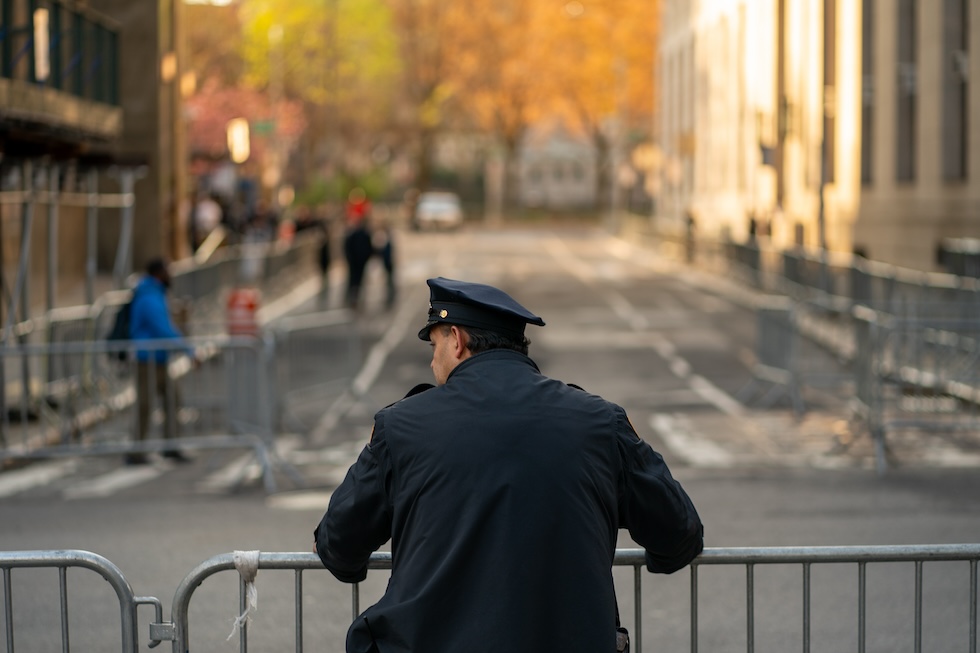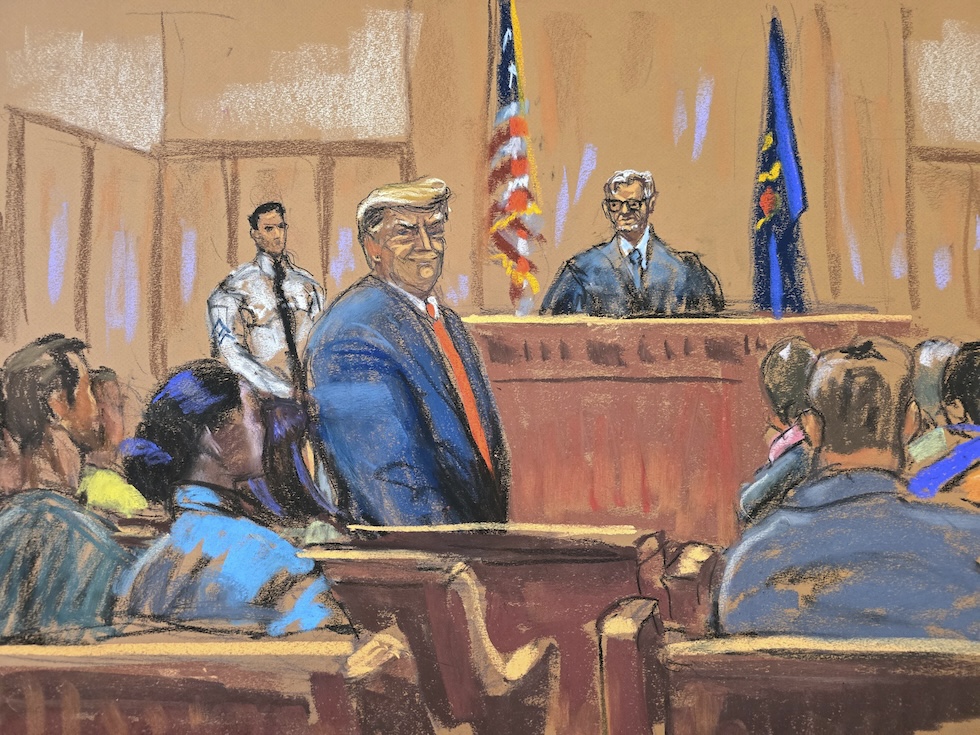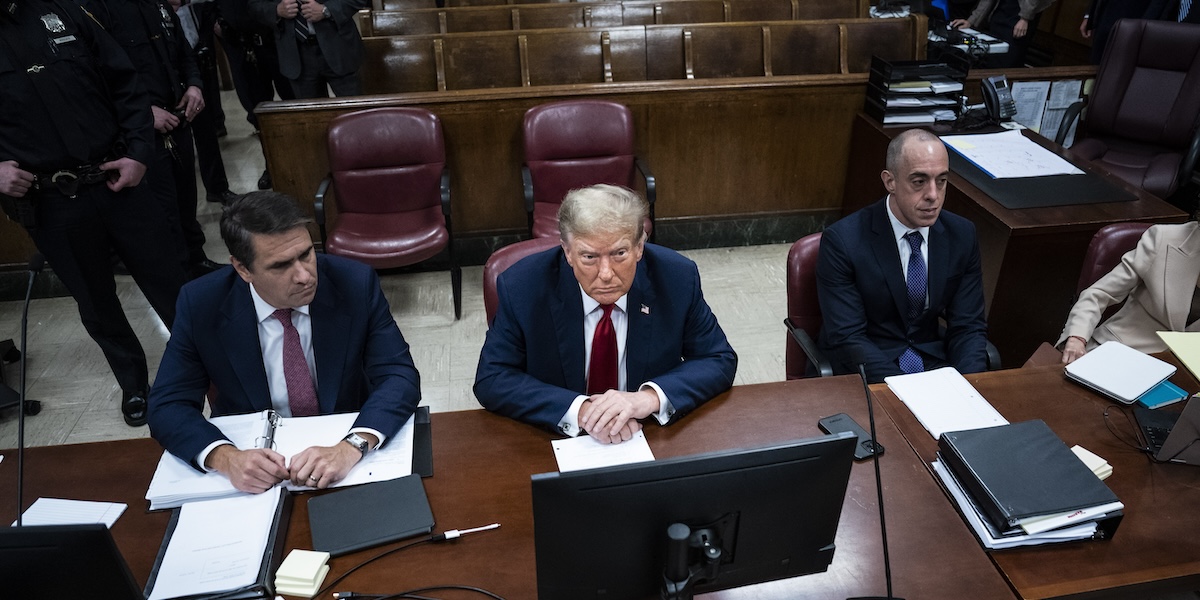loading
The first of four criminal trials involving Donald Trump began Monday in Manhattan, New York, and is also the first in American history in which a former president is charged. The first phase of the trial involves the selection of the popular jury, which will decide whether Trump is guilty or innocent: it is a very important moment in all criminal trials in the United States, and one of the most sensitive phases for defense attorneys and attorneys. Prosecutors represent the prosecution, who typically try to get a jury that is likely to be sympathetic to them, based on social, cultural, and behavioral criteria.
Over time, selection techniques became increasingly codified and stringent, and specific professional personas were created, and the process is often also narrated in novels, films and television series.
In the case of a trial in which the defendant is a well-known and controversial figure such as Donald Trump, jury selection is more complex and important, and it may take several weeks to select the twelve jurors and six alternates. At the first hearing, more than half of the ninety-six potential jurors were present He was excusedThey stated that they could not be neutral, and that they had prior and strong opinions towards the accused Trump.
The trial concerns the payment of $130,000 to pornographic film actress Stormy Daniels, which Trump was accused of paying in 2016 through his company and his former lawyer, Michael Cohen, to buy the actress's silence regarding a sexual relationship she had with him about ten years ago. According to the prosecution, the payment was not properly calculated and campaign funds were used to make it (which is not permitted by law): If found guilty, Trump risks a maximum of four years in prison.
– Read also: The Trump-Stormy Daniels case, in a nutshell
It is believed to be the criminal trial with the least serious charges of the four charges against Trump, but it is also the only one with a specific start date and could be the only one that begins or even ends before the November election. In other courts, Trump was charged with trying to subvert the results of the 2020 presidential election; And trying to change the official results of the presidential elections in the state of Georgia. He kept some secret government documents in his villa in Mar-a-Lago, Florida.

Exterior of the courtroom (Photo by David De Delgado/Getty Images)
As in every criminal trial in the United States, the accused will be tried by a popular jury, a body made up of private citizens who will have to attend all stages of the trial and ultimately express a verdict of guilty or not guilty, based on the evidence and testimony. foot. The actual judiciary (and therefore professional judges) will then decide the punishment. In some cases, American criminal procedures allow the accused to request a trial by a professional judge only, without a jury, but Trump did not exploit this possibility.
Right to be Tried by a jury It is guaranteed by the Sixth Amendment to the United States Constitution, as well as the laws of all states. The selection goes through a first phase in which a large pool of potential jurors is randomly selected from among people who have certain requirements: in the event of Trump's trial, they must be US citizens, adults, residents of Manhattan, speak English and have no criminal record. Records.
Submitting yourself for interview to be selected for the jury is an obligation recognized by law, and if you are judged competent and do not have any impediments it is also mandatory to participate in the trial, in what is known as “jury duty.” This can mean missing a few days of work, for which you are justified but often not paid (and jury compensation is usually low).
The judge asks the appellants whether they believe they can judge the defendants fairly and impartially: That's what happened Monday and led to the exclusion of a large number of potential jurors. At that moment, summoned citizens can also request an exemption for personal reasons (planned medical treatment, university exams, the need to care for a relative who is not self-sufficient), an exemption that is sometimes granted and sometimes not. A famous practice, often recounted and parodied in film and television, is to make outlandish excuses and justifications for exemption from “jury duty.”
This stage is followed by a longer and more complex selection stage by prosecutors and defense representatives. Potential jurors must initially answer a list of 42 questions, relating to work, education, family, political orientation and so-called “media diet”, that is, what tools they use to obtain information. Attorneys for both parties have the right to ask additional questions to obtain clarification of the answers. They will also have access to the names and addresses of potential jurors, and will be able to monitor their online activities, consult electoral records, and check on what occasions they voted (but clearly not for whom).
In Trump's trial, the lawyers will be the only ones who know the identities of the jurors: the court decided that on this occasion they would remain anonymous to protect them from possible interference from outside or from the repercussions of their decision.

In the drawing, Trump smiles at potential jurors at Monday's hearing (Jane Rosenberg/Pool Photo via AP)
Lawyers on both sides will not be able to effectively select jurors, but they will be able to ask for the exclusion of those they do not consider suitable: or rather, in fact, whom they believe are not in their side's favor. The process is called selection Interrogationa French expression meaning “to tell the truth,” and the law guarantees an impartial jury: alleged errors in jury composition are also the basis of many appeals in criminal cases.
The defense and prosecution can request that potential jurors be excluded “for just cause,” if they believe they have biases or conflicts of interest: they can do so without limits on numbers, and the judge decides whether to grant their request. They can also use the right to a The definitive challengeThat is: a “categorical” exclusion without giving a reason. The number of potential jurors who can be excluded in this way varies from state to state and for different types of trials, but is often ten per side.
In this way, parties can effectively exclude jurors they consider likely to be hostile, in an attempt to get as favorable a jury as possible. Over time, starting in the 1970s, this procedure created a real system, namely “Scientific Jury Selection” (SJS) and the birth of specialized professional figures, paralegals for jury selection, which everyone in major law firms and prosecutorial offices uses to represent the prosecution.
The case involving Trump has several peculiarities, which arise primarily from the notoriety enjoyed by the accused, a political figure who sharply divides public opinion. Geographic location should influence the defense in the jury selection process: The Manhattan borough is one of the most progressive in the country, 70 percent of people who registered to vote identify themselves as Democrats, Joe Biden won the presidential election in a landslide. In 2020, Trump received very low approval ratings. New York juries and judges have already convicted Trump in civil trials, convicting him of sexual assault, defamation of a victim, and falsifying his companies' financial statements.
Additionally, unlike most trials, potential jurors may have an interest in serving on the jury, even if it means remaining involved in the trial for weeks. Another much-talked about aspect of jurors in American trials is the situation of those who, due to their participation in a trial lasting several days, are forced to isolate themselves with other jurors, sleeping in a hotel without being able to contact the jurors. The outside world to avoid interference. According to what American newspapers reported from many experts. including The New York TimesHowever, in this case there will certainly be many people who want to be part of the jury because of the historical implications that this trial could have: getting a role is seen by many as an opportunity, not an inconvenience.
According to the same experts, Trump's lawyers could seek out young, working-class whites and African Americans, especially public employees such as policemen, firefighters and nurses. Having defined the defense strategy on the basis that it will be a “politically motivated” prosecution, the defense can look favorably on citizens who have had negative experiences with the justice system. The prosecution must instead choose among highly educated potential jurors from more progressive neighborhoods.
These are very brief and general indicators, and each profile will be specifically analyzed and evaluated, with reference to personal history and every opinion expressed publicly in the past, especially on social networks. The study of jury selection, and above all the exclusion of jurors deemed negative or dangerous, is a long and very in-depth study. These practices are also highly controversial, because they tend to favor defendants who have large, efficient legal teams at their disposal (and thus favor those with a lot of money to afford): various reformist assumptions limit the possibility of investigation. However, the lives of the jurors were not converted into a bill.
The casting process has become a recurring element in so-called legal thrillers, crime novels, films and TV series and the subsequent procedural stage. In particular, John Grisham's novel Jury (The fugitive jury), published in 1996, and its 2003 film adaptation, focus entirely on jury selection in a trial against a cigarette (in the novel) and weapons (in the film) manufacturer.

“Reader. Travel maven. Student. Passionate tv junkie. Internet ninja. Twitter advocate. Web nerd. Bacon buff.”




